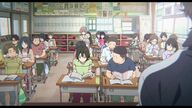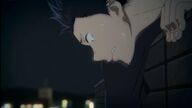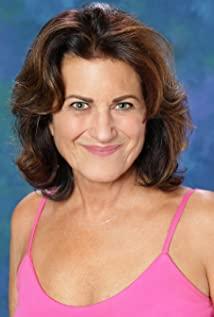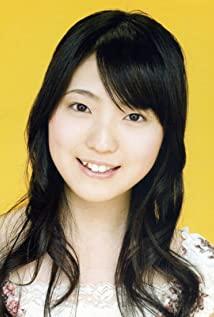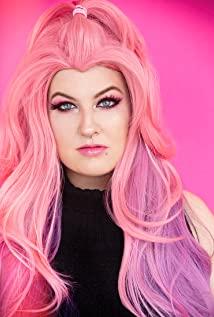Everyone is the same, tired of life. Not being able to accept yourself and others, but blindly talking about love and friendship is actually just a rush to get rid of your shameful life.
Ishida always felt ashamed of Nishinomiya because of her experience of bullying Nishinomiya, and bears the original sin; she always wanted to apologize, "let's end your life to pay for your sins." Ueno lived unabashedly. Good is good and bad is bad, nothing to hide. Bullying is a matter of course for her. "That alien should be bullied and ostracized"; but inside is the kind of dead arrogant who doesn't say it outright even if he likes it, but shows aggressive behavior. In her we see the instinct of people, the instinct to reject dissidents. This is normal, and it may take a long time to overcome. People who cover up differences with hypocritical morals are not normal. It is difficult to admit the inferiority of human beings. This movie does at least that. So, don't think that Ueno exists just to disgust you. Kawai is the so-called hypocrisy. Contrary to Ueno, tea art is a science. Kawai portrays himself as a moral person and a kind person, and exposes all the defects, faults, and pains of others, so as to protect himself from harming others. Her world is framed to be perfect, and it's someone else's fault. The inability to accept one's own imperfection is also the inability to accept oneself.
They all endured life and were stung by life. Without exception. Although the reaction is different, it is just the stress reaction after being injured. for self-protection purposes. Just imagine that dying at this moment would be a relief for them.
And what about Nishinomiya himself? Even she never took her own life seriously. She was apologizing, apologizing all the time. Apologizing for "what"? Apologize for being different, for being "incomplete", and for being "below". Like the above-mentioned people, she cannot face up to her own imperfection, but the "deficiency" is more intuitive in her. In other words, who is not handicapped, who is not mentally handicapped? And they can't accept themselves. My sister took so many photos with the camera, which are the silhouettes of the beautiful nature. I hope to give my sister warmth. Caring at the same time presupposes "she is different from us". Mother cares more about Nishinomiya, and fights to take care of her daughter. She presupposed in her heart that "Nishinomiya is different from us and needs to take care of her more". Although it is an act of caring, it is not different in nature from bullying, it is treated differently. Compassion is not acceptance, sympathy is superior. Maybe we are all approaching and trying to warm others in the way we can think of, but in the end, the other party is pushed to the dead end by accident. What's more, the thought of atonement, the thought of giving one's life to others, is irresponsible. Has Ishida considered Nishinomiya? After considering whether she would accept it, she easily wanted to hand over her life?
All in all, life is a kind of burden, and the more serious one is to live, the more burdened it is. The more sensitive people are, the more likely they are to have a rejection reaction, and the aggressive personality is very likely to hurt others here. The bottom line is that everyone suffers in life. Whether it's revealing the cruelty of nature or trying to smother it under the guise of morality, we all want to find a way to make ourselves a little bit more comfortable. The very precious thing about this time is that it is mixed with cruelty in daily life, and needles are hidden in cotton. It does not pretend, "brutal" appears suddenly and absurdly, like nature itself. The final ending can only be understood as a fairy tale or a fable. Everyone came to an understanding. Everyone who wants to die only really starts to face life when Ishida is only one step away from death. In the end, everyone accepted their own imperfections. Acceptance is equality, not charity.
I tend to think that this kind of thing doesn't happen in reality, this kind of happy ending: Heidegger's Authenticity, Nietzsche's Dionysus. Because of the shock of death, one step across to reality. It can only be understood as the goodwill of the screenwriter, to every audience, every person who has been traumatized, to say comforting words such as "no matter what, at least we try to be considerate of your heart". So still warm.
Because its kindness doesn't fool it. It is real and cruel, it sees the shortness of life, the powerlessness and ignorance of a single individual, vulnerability and still bearing life, wanting to approach but often brings harm, simple and stupid enough to want to atone for sin by suicide, to create a perfect character Hiding behind a moral mask to escape the imperfection, attacking others to gain a real sense of being alive, being unable to express love can only hurt others to vent their emotions, expressing one's own heart through kindness is still unable to accept the other's imperfection...
We're not perfect, but we're still living hard, still trying to get close to each other. We protect ourselves, and we have thought about hurting ourselves and others, and have thought about it for a hundred times. But isn't this life? Let's just pretend it's a white lie.
One more word of "the shape of sound", of course, the sound cannot be a form, and cannot be captured by the eyes. The reason why I say the form of the voice is that it means another world, another world brought about by the possibility of Ishida's death - the transformation of everyone. It seems that their communication is not through straightforward "eyes-sight; ears-hearing", etc., but a space between the senses that can convey meaning, where everyone understands and accepts each other. The world is still the same world, but something has completely changed. Certain relationships take precedence over individual individuals.
View more about A Silent Voice: The Movie reviews





